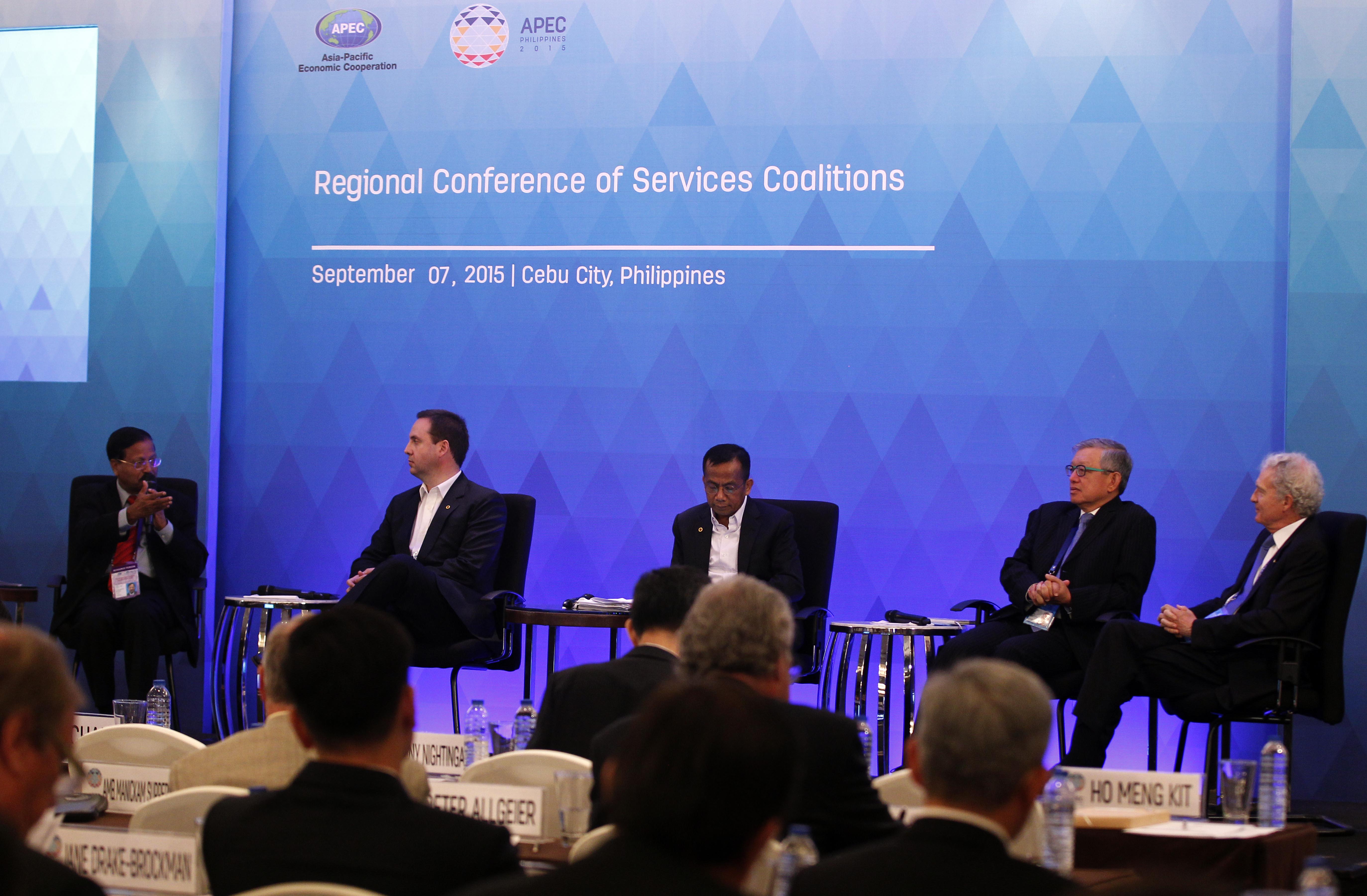Coalition to develop and improve the Service-based Sector
The Asia-Pacific Economic Cooperation (APEC) Summit 2015 focused on inclusive growth for a sustainable and vibrant economy in the Asia-Pacific Region. The APEC meetings were held in different locations in the Philippines this year.
The Role of Services in Economic Growth
During the APEC SRMM, one of the highlights was the first Regional Conference of Services Coalitions where representatives from various service-related enterprises, service-based coalitions, industries and major business organizations convened. These representatives engaged in an open dialogue with APEC Senior Officials, Structural Reform Ministers, business leaders and international experts.
Held on September 7 in Cebu with the theme “Charting a New Course on Services: A Call to Action in APEC”, the Regional Conference of Services Coalition was organized to underscore the significant role that services play in the global trade patterns shown by the increasing number of fragmented services-related tasks.
There were simultaneous forums before the Regional Conference namely the Public-Private Dialogues (PPD) on Services in Clark, Subic last February and in Boracay last May.
“The first PPD featured developments, challenges and opportunities in IT, Business Process Management, Creative Industries, and Research and Development Services. The second PPD covered Manufacturing, Environment, and Agriculture-related Services, as well as the role of services in achieving Inclusive Growth,” said Arsenio Balicasan, the APEC 2015 SRMM Chair and Economic Planning Secretary of the Philippines.
Furthermore, the APEC Business Advisory Council (ABAC) recognizes the services sector as a major driver of economic growth. It generates employment, improved competitiveness and also increases regional integration.
This regional conference emphasized the importance of structural reforms to reduce barriers in the services sector, boost trade, and also to establish a more competitive service sector through maximizing growth opportunities and mutual cooperation.
Asia-Pacific Services Coalition launched
One of the major outcomes of the APEC Summit is the formation of the Asia-Pacific Services Coalition. This Coalition aims to promote an effective platform for dialogue, cooperation and sharing of best practices for the service-based sector in the local, national and regional level.
The Services Coalition, which is the largest group of service sector representatives, will be led by Australian Services Roundtable and the US Coalition of Services Industries as Joint Convenors. It will also be supported by the Philippine Services Coalition and the Lima Chamber of Commerce.
“This Coalition will seek to provide a voice to services stakeholders, and promote a broader understanding of the vast opportunities and the essential measures that need to be considered to realize substantial gains from the sector,” said Balicasan.
On the day of the launching of the Asia-Pacific Services Coalition, a Memorandum of Understanding was officially signed and adopted by the APEC member states.
In the Memorandum, five strategic purposes were outlined. First, the Coalition will foster increased cooperation and dialogue among organizations and businesses on new and emerging domestic, APEEC and international opportunities and developments. Second, it will share information and experiences supported by evidence-based approaches on ways to increase growth and efficiency in services. Third, it will share ideas on how to strengthen the role and membership of individual organizations. Fourth, it will provide a forum for dialogue with APEC Ministers and Officials and ABAC on the APEC services agenda. Fifth, it will provide a regional avenue to develop and advocate interests and recommendations.
“Building a Services Competitiveness Roadmap is at the heart of this Coalition,” said Jane Drake-Brockman, the Senior Services Advisor of the International Trade Centre.
The Major Role of Services in Economic and Inclusive Growth
Anthony Nightingale, Head of ABAC Delegation for the SRMM and ABAC Member of Hongkong said that services account for 70 percent of global GDP and nearly 50 percent of world trade exports.
“Services are important since they lower production costs, and affect a wide range of industries,” said Nightingale in a press conference.
“The Services Sector is a major contributor to output and productivity growth,” said Balicasan.
The Services Sector includes e-commerce, telecommunications, banking and finance, transportation, engineering, construction, legal, healthcare, and education services, among others.
Having an APEC Services Coalition will ultimately benefit the Micro, Small and Medium Enterprises (MSMEs).
“As we seek greater access to larger markets, we need to take measures to prepare Filipino enterprises, especially MSMEs, to integrate into the trading system and embrace the opportunities and challenges of doing business here and abroad,” said Ceferino S. Rodolfo, Assistant Secretary of the Department of Trade and Industry and APEC Senior Official for Trade.
Rodolfo emphasized the importance of enabling MSMEs to be competitive by creating a conducive business climate, and promoting strategic investments, e-commerce training, and providing access to finance.
Among the interventions embodied in the Boracay Action Agenda is the promotion of inclusive financial products and services, which seeks to provide MSMEs access to affordable financial products and services from financial institutions such as banks.
The Philippines led the advocacy in APEC for the implementation of the APEC Boracay Action Agenda, which aims to grow global and dynamic MSMEs.
Challenges faced by the Services Sector
During the Regional Conference, one of the major challenges faced by Services Sector is the domestic regulations.
“The Services sector faces unique and significant barriers that are regulatory in nature. If a regulation is restrictive, it will hinder innovation,” said Balicasan.
Nightingale echoed the sentiment stating that, “Many of the issues faced by Services is behind the borders regulation.”
He outlined three major ways for reforms in the service sector mainly enhancing competition or contestability of markets, ensuring effective regulation to deal with market failures, and attainment of social objectives to promote equity.
“When SMEs get faced with difficult regulations, it’s tough to deal with bureaucracy,” said Nightingale. Thus, he further said that it is essential to have cooperation between government, harmonizing of regulations, transparency in government regulations, consistency, level playing field and speed.
For her part, Brockman emphasized that regulations are necessary, but governments must ensure that it is not burdened by red tape.
To address restrictive regulations that reduce competition and restrict investment options, Nightingale said there is a need for a change in mindset to enable open and competitive services.













